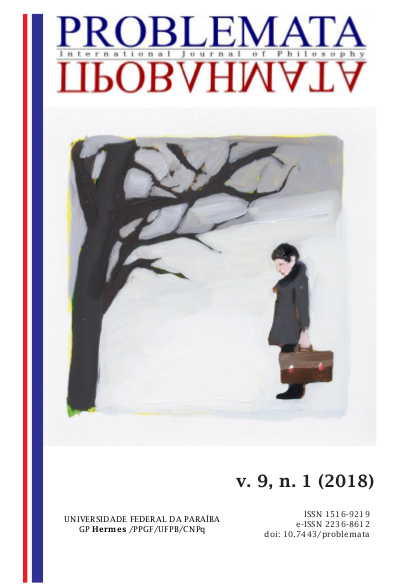PESSIMISM IN GREEK PHILOSOPHY: PHILOSOPHICAL AFFINITY BETWEEN ANAXIMANDER AND SCHOPENHAUER BY THE EYES OF NIETZSCHE
DOI:
https://doi.org/10.7443/problemata.v9i1.38723Keywords:
Guilt, Justice, Pessimism, unit, multiplicity.Abstract
In the book Philosophy in the Tragic Age of the Greeks and the manuscript The Pre-Platonic Philosophers, Nietzsche realizes a rapprochement between Anaximander and Schopenhauer, showing on both a pessimistic philosophy. Based on this perspective of Nietzsche on these two thinkers, this article aims to highlight and to deepen this philosophy affinity, showing on both an ethical conception, metaphysical and cosmological laced with pessimism.Downloads
References
ANAXIMANDRO de Mileto. Doxografia e fragmentos, In: BORNHEIM (Org.) Os Filósofos Pré-Socráticos. São Paulo, Editora Cultrix, 1999.
______. Doxografia e fragmentos. Tradução: Cavalcante de Souza, Coleção Os Pensadores, São Paulo, Editora Abril, 1973.
CACCIOLA, M. L. M. O. Schopenhauer e a Questão do Dogmatismo. São Paulo, Editora da USP, 1994.
CORNFORD, F.M. Principium Sapientiae: as origens do pensamento filosófico grego. Lisboa, Fundação Calouste Gulbenkian, 1975.
NIETZSCHE, A Filosofia na Era Trágica dos gregos; tradução: Gabriel Valladão Silva. – Porto Alegre, RS: L&PM, 2011
______. A Filosofia na Era Trágica dos Gregos, tradução: Fernando R. de Moraes Barros, São Paulo, Hedra, 2008
______. Die vorplatonischen Philosophen. In: Werke. Gesamtausgabe. Zweite Abteilung, Vierter Band. Hereausgegeben von Fritz Bormann. Berlin, New York: Wlater de Guyter, 1995.
SCHOPENHAUER, A. O Mundo como Vontade e Representação. 1º tomo, São Paulo, Editora UNESP, 2005
______. Sobre ética, São Paulo, Hedra, 2012.
Downloads
Published
Issue
Section
License
Authors who publish with this journal agree to the following terms:
- Authors retain copyright and grant the journal right of first publication with the work simultaneously licensed under a Creative Commons Attribution License that allows others to share the work with an acknowledgement of the work's authorship and initial publication in this journal.
- Authors are able to enter into separate, additional contractual arrangements for the non-exclusive distribution of the journal's published version of the work (e.g., post it to an institutional repository or publish it in a book), with an acknowledgement of its initial publication in this journal.
-
- Authors are permitted and encouraged to post their work online (e.g., in institutional repositories or on their website) prior to and during the submission process, as it can lead to productive exchanges, as well as earlier and greater citation of published work (See The Effect of Open Access).





